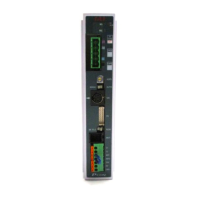149
10.3 Alarm Description Output Using PIO
In PIO patterns 0 to 3 (64 to 512-point positioning type), alarm information can be output using the ports
for completed position output signals (four bits of PM1 to PM8) so that when an alarm occurs, the nature
of the alarm can be identified on the PLC side.
Program the PLC so that whether a given output is a completed position number or alarm can be identified
based on the status of the alarm output signal (*ALM).
Bit assignment table for alarm description (= OFF, = ON)
ALM
PM8 PM4 PM2 PM1 Description: Code number in ( )
x x x x Normal
Software reset command when servo ON (090)
Position number error during teaching (091)
PWRT signal detected during movement (092)
PWRT signal detected before completion of home return (093)
Movement command when servo OFF (080)
Position movement command before home return completion
(082)
Absolute position movement command before home return
completion (083)
Movement command during home return (084)
Position number error during movement (085)
Deceleration command error (0A7)
Unmatched PCB (0F4)
Parameter data error (0A1)
Position data error (0A2)
Position command information data error (0A3)
Unsupported motor/encoder type (0A8)
Excitation detection error (0B8)
Home sensor not detected (0BA)
Home return timeout (0BE)
Excessive actual speed (0C0)
Motor power-supply overvoltage (0C9)
Overheating (0CA)
Control power-supply overvoltage (0CC)
Control power-supply voltage low (0CE)
Deviation overflow (0D8)
Software stroke limit overtravel error (0D9)
Out of push & hold operation range error (0DC)
Servo error (0C1)
Relating to encoder disconnection
Encoder receive error (0E5)
Phase-A/B disconnection detection (0E8)
Phase-A disconnection detection (0E9)
Phase-B disconnection detection (0EA)
Absolute encoder error detected 1 (0ED)
Absolute encoder error detected 2 (0EE)
Absolute encoder error detected 3 (0EF)
CPU error (0FA)
FPGA error (0FB)
Logic error (0FC)
Nonvolatile memory write verification error (0F5)
Nonvolatile memory write timeout (0F6)
Damaged nonvolatile memory (0F8)

